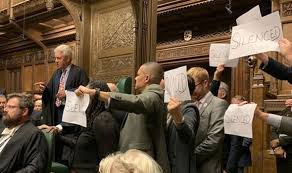Fortunately, the sad state of our national politics does not disallow the chance of cultivating other forms of affiliation. We need to find frames that will keep us in awe of the miraculous efforts of others.
It is axiomatic that we view the world from a set of durable frames. Duty, imagination and comfort feed into our choices. But it is not uncommon that we find ourselves in a rut, governed by a continuing point of reference that no longer offers the experiences that sustain us. Everyone’s moments of bliss are different. I can only use the example of my experience. But the general question is universal: what frames of reference reward us?
For many years my professional frame of reference happened to include the exploration of political communication patterns in our national life. I taught the subject, wrote extensively about it, and responded with guest columnist jeremiads when our national discourse seemed to be withering. A representative part of this frame included three editions of a book, Political Communication in America, written with my colleague Robert Denton Jr. The first edition was in 1985: a panoramic look of topics as diverse at the presidency and congressional lobbying.
As the state of our national politics seemed to sour, I gradually changed my academic focus to escape into more rewarding and less explicitly political areas, mostly by returning to my earlier roots of modern rhetorical theory. One representative book representing this shift was a 2010 project subtitled The Rhetorical Personality. It freed me from what had become a near obsession with the study of our federal establishment. That culture has been spent by the small-minded politicking that has crept into the deliberative side of our politics. Too many people seeking what should have been deliberative roles have found more rewards in politics as performance. Still in the future, the seeds of this decay of would take root a thicket of corrupted rhetoric after 2016, culminating in the destruction of norms of the presidency that I never imagined would be at risk.
For me, a book looking at embedded personality traits of people destined to be in the public was a fresh start. It sought to be a collection of insights that my education was meant to encourage. I soon followed up with two more contributions exploring the nature of human rhetoric: one in the form of a book on the rhetorical and psychological processes of identification, and a second parallel study of how we assign motives to others in the face of little evidence.
 That’s my story of a change of frames of reference for organizing my professional life. In retrospect, I could not have sustained my career of 47 years if I had stayed on my original path. Political communication had become a dispiriting subject. By 2016 I mourned the devolution of a viable Republican Party at the hands of millions who have abetted it. In very different ways those people are as disappointed with their perceptions of the nation’s direction as I was. For many reasons the political culture of this great country forces its citizens to witness horrifying attitudes and events. We may feel it these effects all the more because, as columnist David Brooks has noted, we are “overpoliticized while growing increasingly undermoralized, underspiritualized, undercultured.”
That’s my story of a change of frames of reference for organizing my professional life. In retrospect, I could not have sustained my career of 47 years if I had stayed on my original path. Political communication had become a dispiriting subject. By 2016 I mourned the devolution of a viable Republican Party at the hands of millions who have abetted it. In very different ways those people are as disappointed with their perceptions of the nation’s direction as I was. For many reasons the political culture of this great country forces its citizens to witness horrifying attitudes and events. We may feel it these effects all the more because, as columnist David Brooks has noted, we are “overpoliticized while growing increasingly undermoralized, underspiritualized, undercultured.”
There’s also another related and distinctly personal thread here. A family member happens to work as a mental health therapist. So, in addition to all of our casual discussions, by happenstance the common reading material at our breakfast table often included the Psychotherapy Networker, a glossy but well edited monthly written for professionals engaged in private practices or associated with institutions. Over the years touching base this resource set my sights on the redeeming traits of a therapeutic frame of reference. Unlike the competitive and combative realms of national politics, those doing mental health counseling are far more interested in the softer impulses of collaboration, conciliation, and empathy. In this frame, verbal combat is not a useful process. No one is considered a lost cause, and everyone has a backstory that at least partly accounts for sometimes egregious thoughts and behaviors.
There Are Many Ways to Connect
We could include other frames that occupy the time and thinking of different individuals we may know. Some find it easier to get up in the morning because of football, or the frame of firm religious conviction, or the organizing principle of broadening boundaries through travel. My own preference is to escape into hours of listening and learning about music. For me—if not always the musicians who produce it—rigid ideological differences seem to dissolve into forms that renew us. There is real joy in this special form of “rhetoric” which is non-stipulative and, thanks to the conventional rules of the chromatic scale, largely and happily resolved.
Here’s my point. Everyone will use their own lens to bring their lives into focus. And while the nation is entering a very dark period, we need to protect our sense of place with interests that give us pleasure. To be sure, we can never abandon participation in the civil life of a nation. This requires us to hold on to connections to civil society groups, including the press, while engaging in other processes that are necessary in an open society. But this does not disallow chances for cultivating other forms of affiliation that will keep us in awe of the miraculous efforts of others.
![]()

 The authors call them “chaos voters.”
The authors call them “chaos voters.” The research paper “A ‘Need for Chaos’ and the Sharing of Hostile Political Rumors in Advanced Democracies” is the work of Danes Michael Petersen and Mathias Osmundsen, along with Kevin Arceneaux at Temple University. The paper’s thesis is that “chaos Incitement” has become its own political objective for some voters in western democracies. This often means abandoning the value of consensus-building and at the same time demonizing enemies and violating long standing political norms. While the conclusion of the paper isn’t surprising, it is sobering to see that many citizens, especially in the United States, are more interested in the destruction of institutional values than the refinement of them. The authors found significant agreement among supporters of President Trump with the following kinds of agree/disagree items:
The research paper “A ‘Need for Chaos’ and the Sharing of Hostile Political Rumors in Advanced Democracies” is the work of Danes Michael Petersen and Mathias Osmundsen, along with Kevin Arceneaux at Temple University. The paper’s thesis is that “chaos Incitement” has become its own political objective for some voters in western democracies. This often means abandoning the value of consensus-building and at the same time demonizing enemies and violating long standing political norms. While the conclusion of the paper isn’t surprising, it is sobering to see that many citizens, especially in the United States, are more interested in the destruction of institutional values than the refinement of them. The authors found significant agreement among supporters of President Trump with the following kinds of agree/disagree items: